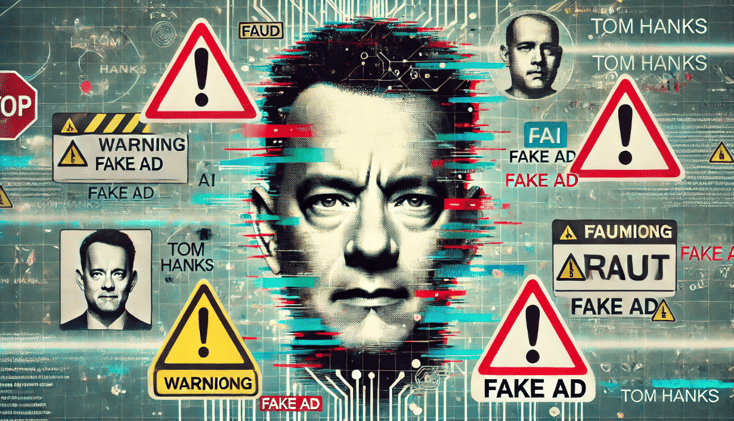Image Source: ChatGPT-4o
A Growing Concern for Celebrities
Tom Hanks has issued a public warning to his fans about false advertisements circulating online that misuse his name, likeness, and voice to promote so-called ‘wonder drugs.’ The Hollywood star took to Instagram on Thursday to alert the public about these fraudulent ads, which he claims were created using artificial intelligence (AI) without his consent.
Hanks’ Public Service Announcement
In his Instagram post, Hanks expressed his concerns over the unauthorized use of his identity in these ads. "There are multiple ads over the internet falsely using my name, likeness and voice promoting miracle cures and wonder drugs," Hanks wrote. "These ads have been created without my consent, fraudulently and through AI."
Hanks further emphasized that he has no connection to these advertisements or the products they are promoting. "I have nothing to do with these posts or the productions and treatments, or the spokespeople touting these cures," he continued.
He also reminded his followers of his own health condition, stating, "I have type 2 diabetes, and I ONLY work with my board certified doctor regarding my treatment. DO NOT BE FOOLED. DO NOT BE SWINDLED. DO NOT LOSE YOUR HARD EARNED MONEY."
Image Source: Tom Hanks Instagram Post
A Repeating Pattern of Scams
This is not the first time Hanks has cautioned the public about scams using AI to replicate his identity. In October, he warned fans about a similar scam involving a dental company, which used an AI-generated version of him to promote a dental plan.
"There’s a video out there promoting some dental plan with an AI version of me," he wrote on Instagram at the time. "I have nothing to do with it."
The Rise of AI-Generated Content
This is not just a concern for Tom Hanks or his fans; many celebrities are facing similar issues. Country music star Lainey Wilson also testified to Congress earlier this year about the misuse of celebrity likenesses through AI.
Lainey Wilson’s Testimony on AI Misuse
Wilson revealed that her image was used to promote weight-loss gummies, a product she would never endorse, especially considering her influence on young fans. She emphasized the importance of promoting self-confidence and body positivity among her young audience, noting that endorsing weight-loss products would go against her values.
The Dark Side of AI: Misrepresenting Celebrity Identities
Wilson discussed the troubling use of AI-generated content that misrepresents musicians by placing their voices and images in inappropriate contexts or having them perform lyrics they wouldn’t normally endorse. She expressed deep concern over the misuse of her identity and stressed that such actions are fundamentally wrong.
The Potential Risks of AI-Generated Content
Wilson acknowledged that while AI has potential benefits, it also poses significant risks to personal rights. "There aren’t many things that we can control in life," she said, "but making decisions about the use of our own selves, our own unique qualities, that should be one."
"I am excited about a lot of ways that artificial intelligence can be used to help people," Wilson continued, "but I’m nervous about how it can be used to take personal rights."
The Need for Better Regulations and Education
The rise of AI-generated content and fake celebrity endorsements highlights the urgent need for stronger regulations and increased public awareness. By implementing better safeguards and educating consumers, we can help prevent individuals from being misled by fraudulent advertisements and ensure that the integrity of personal identities is protected.
Why Celebrities Are Speaking Out Against AI-Generated Content
Celebrities like Tom Hanks and Lainey Wilson are speaking out against AI-generated content because they understand the impact it has on their fans. By misrepresenting their identities, these scams can deceive people into purchasing products or services that may not be beneficial to them.
The Risks of Misusing Celebrity Identities
The misuse of celebrity identities through AI-generated content poses significant risks to individuals and society as a whole. These risks include:
- Financial loss: People may lose money by purchasing products or services promoted by fake celebrity endorsements.
- Emotional manipulation: Celebrities’ images and voices can be used to manipulate people’s emotions, making them more susceptible to false information.
- Eroding trust: The misuse of celebrity identities can erode trust between celebrities and their fans, leading to a breakdown in relationships.
The Importance of Regulation
To prevent the misuse of AI-generated content and protect personal rights, stronger regulations are needed. This includes:
- Implementing clear guidelines: Establishing clear guidelines for using AI-generated content to promote products or services.
- Educating consumers: Informing people about the potential risks associated with AI-generated content and fake celebrity endorsements.
- Supporting research: Encouraging research into the development of more sophisticated AI-powered tools that can detect and prevent these scams.
The Future of AI-Generated Content
While AI has the potential to revolutionize various industries, it is crucial to acknowledge its limitations. By understanding the risks associated with AI-generated content and implementing better regulations, we can ensure that this technology benefits society as a whole.
Conclusion
Celebrities like Tom Hanks and Lainey Wilson are using their platforms to raise awareness about the misuse of AI-generated content. It is essential for individuals, policymakers, and industry leaders to work together to develop effective solutions to prevent these scams and protect personal rights.
By promoting education, implementing stronger regulations, and supporting research, we can harness the potential benefits of AI while minimizing its risks.

